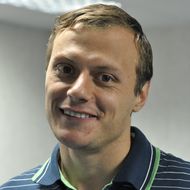HSE University Becomes the First Russian University to Confer a Doctoral Degree in Computer Science

Upon successfully defending his dissertation before HSE Dissertation Council in Computer Science, Pavel Dvurechensky became the first Doctor of Computer Science in Russia. This was possible thanks to the fact that, starting in 2018, HSE University received the right to award its own academic degrees.
Pavel Dvurechensky, Senior Research Fellow at the International Laboratory of Stochastic Algorithms and High-Dimensional Interference, told HSE News Service about his research.

Pavel Dvurechensky
The topic of my dissertation is ‘Numerical optimisation methods for high-dimensional problems: imprecise oracle and straightforward binary analysis’. In my work, I consider high-dimensional optimisation problems. For example, when is it necessary to make the predictions of a parametric model as close to the real world as possible? My dissertation studied two classes of methods: methods with some inaccuracy, such as randomness in data, and methods with constraints, mostly linear. In particular, methods from the second class are applied to optimal transport problems, in which it is necessary to optimally transfer the distribution of a mass from one place to another. This topic is now very popular in machine learning, in particular when applied to image analysis, since it allows us to determine the distance between images. Then you can take a specific set of images, count the distance between them, and, on the basis of these mutual distances between images, try to classify them. Or you can take a set of images of, for example, the handwritten number ‘three’: you can count their average using the Wasserstein Baricenter, which is defined by this transport distance, and then, if a new image appears, you can measure the distance from it to this average. If the distance is small, we can conclude that it is also the figure ‘three’.
I can't say that I am particularly proud of the fact that I became the first Doctor of Computer Science in Russia. But I am happy about it. I look at it as having completed the next stage in my career—a phase in which I accumulated enough groundwork for a dissertation and then defended it. I plan to continue working in this area, writing articles on related topics and submitting papers to journals and conferences.
I would like to thank the members of the committee for their valuable comments on the work, my advisor Aleksandr Gasnikov and my co-authors for their fruitful cooperation; Vladislav Matukhin and the manager of the dissertation council, Sergey Silantiev, both of whom helped me greatly in collecting and preparing documents for the defence; Aleksander Biryukov for involving me in teaching optimisation at the beginning of my journey; Yury Nesterov and Boris Polyak, who had a great influence on me scientifically; HDILab supervisor Alexey Naumov; my parents; and of course my wife and daughter for their support during the writing of my articles and thesis.

Aleksandr Gasnikov,
dissertation advisor
Since 2012-2013 Pavel and I have worked as co-authors, finding ourselves in the same laboratory under the guidance of Prof. V.G. Spokoyny. Since 2014-2016 we started to have our first serious publications (NIPS, journals in Scopus Q1), and since then Pavel and I have published about a dozen articles every year. When it became possible to defend a dissertation in the form of a collection of published articles, we decided to give it a try. I am very glad that everything ended well. Pavel undoubtedly deserves it.
To be honest, we didn't even realise that we were the first — all the processes were streamlined and set in motion. I defended my dissertation in 2016 and I remember how much work it is to prepare a dissertation. It is wonderful that HSE now offers this alternative defence option like many leading universities in the West do: we take the text of a set of major articles, from them we compile a short version (conditionally speaking, an ‘abstract’) with a summary of the main results.
The text of the dissertation itself is just a variant of the abstract and the attached articles. And then the decision is made as to whether the applicant is awarded the title of Doctor of Science. HSE University keeps up with the times and makes such things possible. It is also nice that the system thus has the opportunity to support and encourage its employees (this term Pavel taught a course on numerical methods of optimisation in the Faculty of Computer Science, having mastered the subject under the world-famous specialist in the field of optimisation Y. E. Nesterov).
The fact that this defence is taking place at HSE University and that a good scientist who works hard and efficiently chose the HSE University Dissertation Council in Computer Science for their defence is a success of the system, noted Anton Osokin, deputy chairman of the dissertation council. He also stressed that the level of Pavel Dvurechensky's publications is beyond doubt, which is why he opted to present his dissertation as a set of papers.

Anton Osokin,
Deputy Chair of the Dissertation Council
Not long ago HSE University was authorised to award its own academic degrees. In particular, there are special degrees in computer science. There is no explicit degree in computer science in the Higher Attestation Commission system, because the system changes slowly, and when it was created, computer science was very different from today. For example, there is no clear answer in the Higher Attestation Commission system as to what discipline people with machine learning research should defend themselves in.
I encountered a lack of understanding from my foreign colleagues as to why I have a degree in physics and mathematics when I do machine learning. So I think that the appearance of a degree in computer science is very good, because it corresponds to the concept of computer science outside of Russia.
It is also important who makes the decision to award the degree. In the Higher Attestation Commission system, the entire council does this, but often many of the participants in the process are not experts specifically in the field of work and approach the defence quite formally. In HSE University’s system, the main recommendation is made by a committee of five people who are specially selected by the council as experts on the topic of the dissertation, which is very important, because they engage with the text on a much deeper level.
The main condition for defending a dissertation is publication. The criteria for evaluating publications in our council are aligned as far as possible with those globally. For example, in the field of machine learning all major publications are published at leading conferences (such as NeurIPS and ICML) and according to our criteria, such publications are equated to articles in highly ranked journals — the Higher Attestation Commission system has difficulties with this. It is good that our defence is possible based on a set of papers — applicants whose level of publications is very high need to overcome fewer bureaucratic obstacles in order to obtain a degree.
See also:
HSE Team Takes First Place in RuCode Algorithmic Programming Championship
On October 20, 2024, the final round of the RuCode Algorithmic Programming Championship took place, setting a new record in the Russian Book of Records as the ‘Largest Competitive Programming Event.’ The event, held simultaneously across 24 locations, hosted 1,450 participants divided into 500 teams. The overall winner of the senior team division was the M.O.S.C.O.W. team from the HSE Faculty of Computer Science (FCS).
HSE Teachers Awarded Yandex ML Prize
The awards ceremony for the international Yandex ML Prize was held in Moscow. This year, all three winners in the ‘ML Educators’ category were HSE faculty members—Evgeny Sokolov, Associate Professor and Head of the Big Data and Information Retrieval School, Anton Konushin, Associate Professor at the Faculty of Computer Science, and Aleksei Shpilman, Associate Professor at the Department of Informatics at HSE’s St Petersburg School of Physics, Mathematics, and Computer Science.
Researchers at HSE in St Petersburg Develop Superior Machine Learning Model for Determining Text Topics
Topic models are machine learning algorithms designed to analyse large text collections based on their topics. Scientists at HSE Campus in St Petersburg compared five topic models to determine which ones performed better. Two models, including GLDAW developed by the Laboratory for Social and Cognitive Informatics at HSE Campus in St Petersburg, made the lowest number of errors. The paper has been published in PeerJ Computer Science.
HSE and Yandex to Expand Collaboration in Training AI Specialists
Over the next ten years, the partnership between Yandex and the HSE Faculty of Computer Science (FCS) will broaden across three key areas: launching new educational programmes, advancing AI research, and exploring the application of generative neural networks in the educational process. Established by HSE University and Yandex a decade ago, the Faculty of Computer Science has since emerged as a frontrunner in training developers and experts in AI and machine learning, with a total of 3,385 graduates from the faculty over this period.
Two HSE Researchers Receive Yandex ML Prize
Two researchers from the HSE Faculty of Computer Science—Aibek Alanov, Junior Research Fellowat the Centre of Deep Learning and Bayesian Methods, Research Fellow at AIRI; and Pavel Braslavski, Associate Professor, Senior Research Fellow at the Laboratory for Models and Methods of Computational Pragmatics—are among the winners of the 2023Yandex ML Prize (formerly the Ilya Segalovich Award).
Days of Computer Science Held at HSE University
Every spring, HSE University’s Faculty of Computer Science, which this year turns nine years old, traditionally opens its doors and invites everyone to a festival. This time, more than 20 events with over 2,000 registered participants were held between April 8th and 16th as part of the Days of Computer Science.
Light Breezes Improve Moods of Social Media Users
Sergey Smetanin, Research Fellow of the HSE Graduate School of Business, conducted a large-scale analysis to examine the impact of weather conditions on the sentiments expressed by users of the Odnoklassniki (OK) social network. The findings have been published in PeerJ Computer Science. This is the first study of its kind in Russia.
Three HSE Researchers Receive Ilya Segalovich Award
Three researchers of the HSE Faculty of Computer Science are among the winners of the 2022 Ilya Segalovich Award: Research Professor Dmitry Vetrov, Associate Professor Alexey Naumov and doctoral student Sergey Samsonov. The award, established by Yandex in 2019, is aimed at supporting young researchers and the scientific community in the field of IT in Russia, Belarus and Kazakhstan.
‘Computer Methods of Cognitome Analysis’ Conference to Explore New Perspectives on Memory and Consciousness
On September 1–3, the HSE International Laboratory of Algebraic Topology and Its Applications will host the international conference 'Computer Methods of Cognitome Analysis'. Konstantin Sorokin, Research Assistant at the Laboratory and organiser of the conference, spoke about the main topics of the event and his hope that it will inspire pure mathematicians, physicists and computer scientists to apply their knowledge and intuition to the problems of brain-function mechanisms.
HSE University Maintains Positions in Two THE Subject Rankings
HSE has been included in two Times Higher Education (THE) subject rankings. It is ranked in the Top 500 for Computer Science and in 801-1000 group for Engineering.


